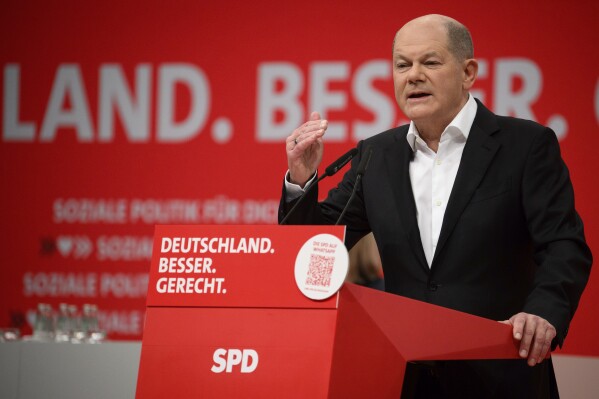Hundreds of Georgians march in support of country’s candidacy for European Union membership
TBILISI, Georgia (AP) — Hundreds of people marched in Georgia’s capital Saturday to support the Caucasus region country becoming a candidate for European Union membership.
The EU is expected to announce Dec. 15 whether it has decided to grant Georgia candidate status, a crucial milestone for potential membership. The government was told last month that it should officially receive candidacy once it addresses specific shortcomings, including in the fight against corruption and election deficiencies.
Participants in the “Your Voice to EU” rally in Tbilisi marched from First Republic Square to Europe Square, where a huge EU flag was unfurled. Organizers said that each star on the flag was made in a different region of Georgia, symbolizing the Georgian people’s unity in the aspiration for their country to join the 27-nation bloc.
The march was initiated by President Salome Zourabichvili and organized by civil society groups.
 Germany’s Scholz confident of resolving budget crisis, says no dismantling of the welfare state
Germany’s Scholz confident of resolving budget crisis, says no dismantling of the welfare state
 A fire in a hospital near Rome kills at least 3 and forces the evacuation of facility and patients
A fire in a hospital near Rome kills at least 3 and forces the evacuation of facility and patients
 Polish truck drivers are blocking the border with Ukraine. It’s hurting on the battlefield
Polish truck drivers are blocking the border with Ukraine. It’s hurting on the battlefield
“This is a peaceful march, a demonstration of the people’s will and choice that has been reflected in many initiatives,” Zourabichvili said at Saturday’s event. “This latest initiative, which we are all joining, loudly voices our main wish to the European Union – that we want Europe.”
Zourabichvili’s presence at pro-EU rallies, together with earlier statements against a proposed foreign agent law, indicate a growing divide between her and the ruling Georgian Dream party.
Zourabichvili does not belong to any political party, but Georgian Dream backed her candidacy in the 2018 presidential election. Since assuming office, she has increasingly disagreed with the ruling party’s decisions and policies, especially on foreign affairs.
Opposition parties in recent years accused Georgian Dream of pursuing pro-Russia policies while claiming to be Western-oriented. Opponents charge that the party’s founder, former Prime Minister Bidzina Ivanishvili, a billionaire who amassed a fortune in Russia, has continued calling the shots in the former Soviet republic of 3.7 million people even though he currently doesn’t hold a government job.
The party has repeatedly denied any links to Russia or that it leans toward Moscow.
Huge protests in March saw Georgian Dream withdraw legislation that would have required media and nongovernmental organizations that receive more than 20% of their funding from foreign sources to register as “agents of foreign influence.”
Opponents argued the bill was inspired by a similar law that Russia uses to stifle dissent and silence critics. They also warned that the adoption of such a law in Georgia might prevent the country from one day joining the EU and NATO.
Russia-Georgia relations have been rocky and complicated since the Soviet Union’s collapse. The two countries fought a short war in 2008 that ended with Georgia losing control of two Russia-friendly separatist regions. Tbilisi had severed diplomatic ties with Moscow, and the issue of the regions’ status remains a key irritant even as bilateral relations have somewhat improved.
___ Morton reported from London.
Disclaimer: The copyright of this article belongs to the original author. Reposting this article is solely for the purpose of information dissemination and does not constitute any investment advice. If there is any infringement, please contact us immediately. We will make corrections or deletions as necessary. Thank you.



